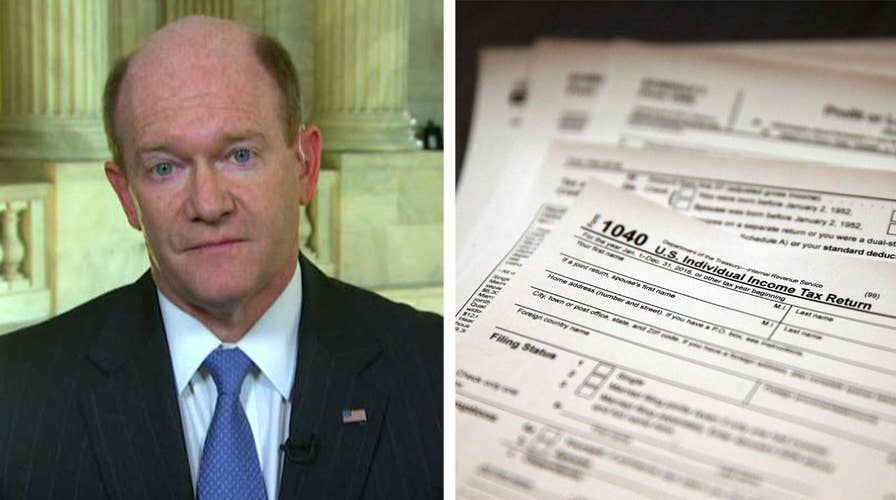Sen. Chris Coons calls for bipartisan tax reform proposal
Democratic senator from Delaware shares his take.
This is a rush transcript from "Your World," October 26, 2017. This copy may not be in its final form and may be updated.
NEIL CAVUTO, "YOUR WORLD" HOST: All right, no Democrat voted for this budget matter in the House today.
What happens now in the Senate with Chris Coons, the Democratic Delaware senator, also serves on Senate Judiciary Committee.
Sir, very good to have you. Thank you.
SEN. CHRIS COONS, D-DELAWARE: Great to be with you again, Neil.
CAVUTO: As you see things now, how would you vote?
COONS: As I see things now, how would I vote on what?
CAVUTO: On the tax framework that they so far point out. And you're quite right. We won't know the details of the brackets until next week.
(LAUGHTER)
COONS: OK. Right. Right.
CAVUTO: But many in your party have always argued it's tilted to the rich. Your thoughts?
COONS: Well, what we have got so far is a fairly broad, fairly gauzy tax proposal.
It's about nine pages, but it's not yet a bill. It has not been analyzed or scored. We don't know the details.
To the extent that it follows the broad framework and cuts $470 billion out of Medicare and a trillion out of Medicaid over 10 years, I would oppose that. To the extent it fails to really deliver significant tax relief to the middle class, I would oppose it.
But I think there are things that we could and should be doing on a bipartisan basis.
Neil, yesterday, I introduced a bill here in the Senate where my lead legislative partner in the House is Ted Poe, one of the most conservative House members from Houston, Texas. My partner here in the Senate is Jerry Moran of Kansas, a conservative Republican.
And it's a bill that would help finance energy production in the United States that is good for oil and gas and pipelines and for renewables.
I have got proposals, bipartisan proposals, that would help strengthen manufacturing. Neil, I do think there's things we can do in tax reform that will make it something that can get bipartisan support. But, so far, it's only been written by one party, and I think that will make it harder for it to succeed.
CAVUTO: Senator, one of the arguments that Republicans have been raising is that maybe if they make the tax package that they are working on -- you're quite right, we will know details next week, with brackets, et cetera -- is maybe offering an additional bracket for the very rich, that they -- that their taxes will stay the same, and maybe even go higher if they're not allowed state and local tax deductions, and that that might win over Democratic votes, maybe your own.
Would it?
COONS: Making the tax system more progressive, but also simpler and fairer, and making it a tax framework that encourages investment and job- creating activity, like infrastructure and manufacturing, all of that would move in the right direction, in my view.
CAVUTO: What about the deduction for state and local taxes? What about 401(k) contributions and keeping them tax-deductible right now? Where do you stand on either, both?
COONS: Well, I'm from the state of Delaware. We have relatively low property taxes compared to our surrounding states, but relatively high compared to the rest of the country.
About a third of all Delawareans take advantage of the state and local tax deduction. And it's worth about $9,000 per household. That would mean a significant tax increase for a number of Delawareans and Delaware families if we got rid of state and local.
I think we will see that it's unpopular in the House in a broader range of districts than might have initially been expected.
And the 401(k), we have a retirement savings crisis currently and growing in the years ahead. My very first job here in Senate as an intern as for Bill Roth, Republican, former senator from Delaware, author of the Roth IRA.
CAVUTO: Sure.
COONS: He saw savings and saving for retirement as one of the biggest challenges facing America.
And I think we're also going to see capping or eliminating the 401(k) deduction as something that will face a lot of resistance. That's why it's hard to put together a tax reform package, Neil, is there's no unguarded money here in Washington. And I do think we're going to find it controversial if, in looking for revenue, the tax package, once it comes out next week, includes cuts to either state and local deduction or the 401(k).
CAVUTO: Yes, you reminded me of Senator Roth. And Kemp, Roth, remember, they went back and forth, whose name should go first.
COONS: Yes, exactly.
CAVUTO: Senator, very good seeing you again. Thank you for taking the time.
COONS: Thank you, Neil.
CAVUTO: All right.
END
Content and Programming Copyright 2017 Fox News Network, LLC. ALL RIGHTS RESERVED. Copyright 2017 CQ-Roll Call, Inc. All materials herein are protected by United States copyright law and may not be reproduced, distributed, transmitted, displayed, published or broadcast without the prior written permission of CQ-Roll Call. You may not alter or remove any trademark, copyright or other notice from copies of the content.

